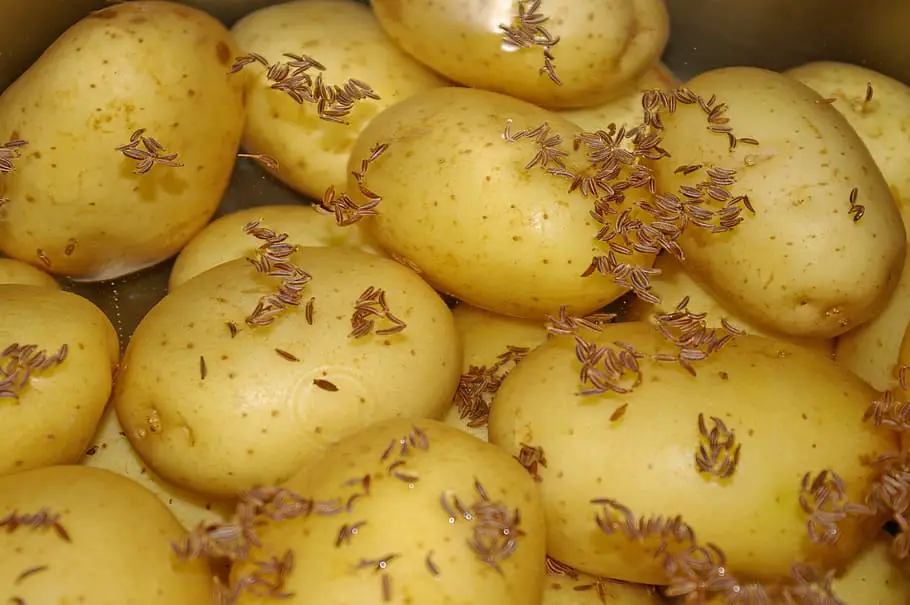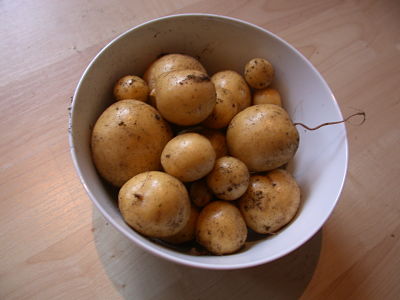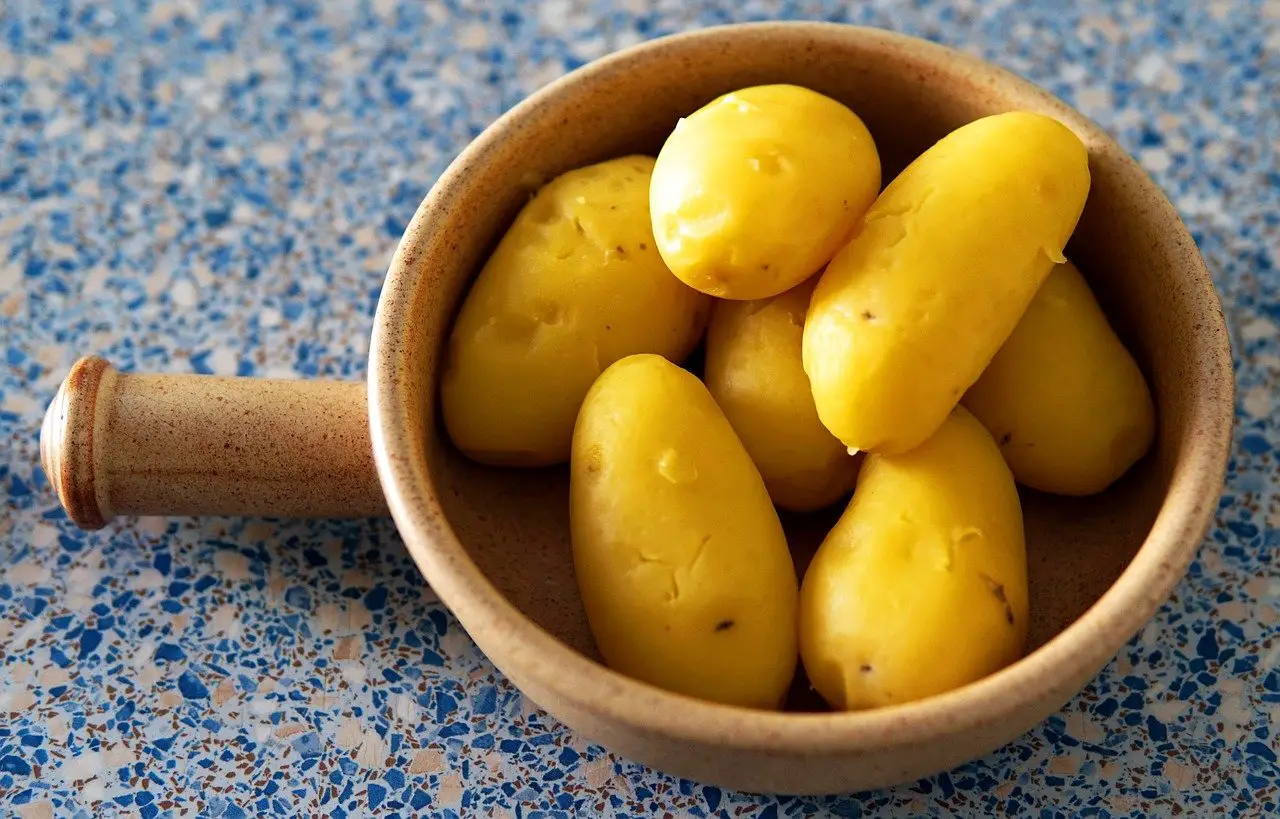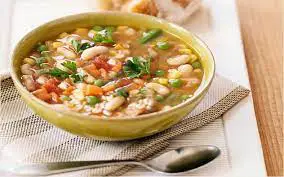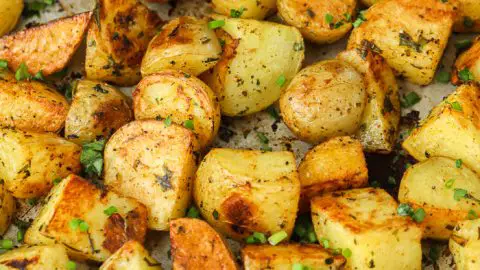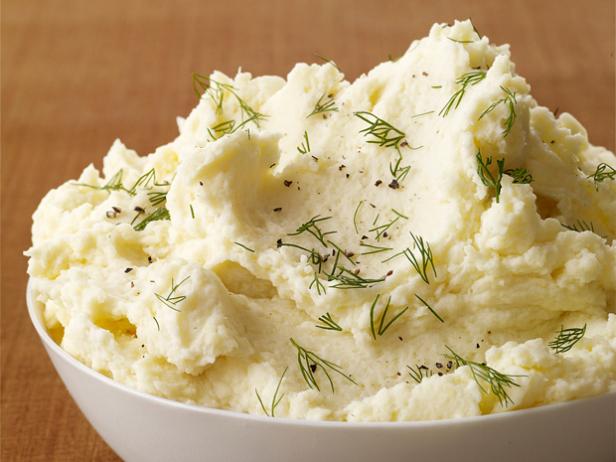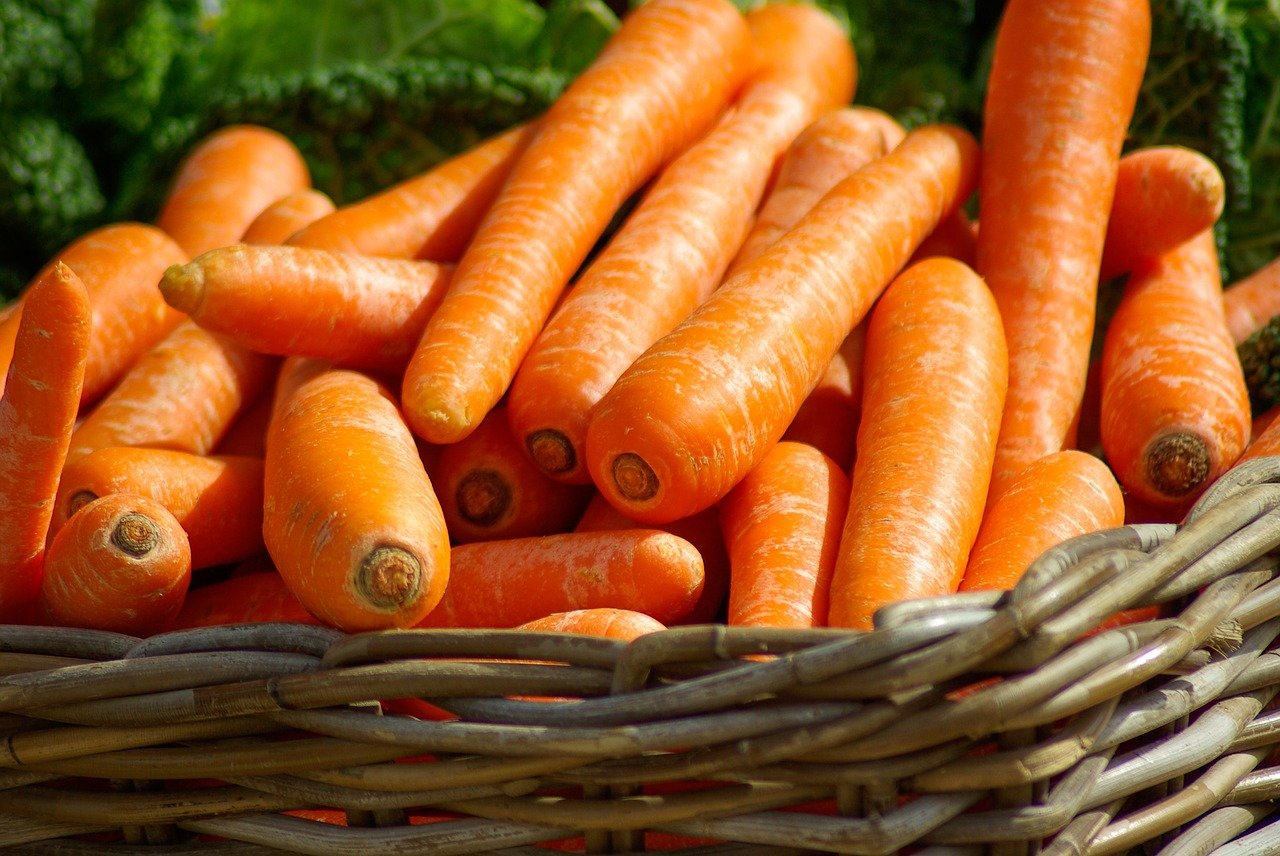Can you eat uncooked potatoes?
 Can you eat undercooked potatoes? If you don’t have any idea, I suggest that you go through this post for further details.
Can you eat undercooked potatoes? If you don’t have any idea, I suggest that you go through this post for further details.
Potatoes are one the most versatile foods on earth. They have been a staple food in many cultures around the world for the past few centuries.
However, raw or undercooked potatoes are a common ingredient that you don’t often see in many dishes. There is a reason!
Although you might find raw potatoes in a few gourmet dishes or salads, the majority of people working in the food industry avoid them. Because large quantities of potatoes that have not been fully cooked can cause discomfort in the digestive system and even worse, potentially dangerous symptoms.
Can you eat uncooked potatoes? You shouldn’t. Proper cooking is necessary to make potato starch granules more palatable. Uncooked potatoes are bland in flavor and texture. They also contain resistant starch, which is indigestible by your body. They can cause problems with digestion and could contain dangerous compounds like solanine.
To avoid certain risks, ensure that your potatoes are well-cooked.
How to tell if your potatoes are undercooked?
You can check if your potatoes have been undercooked easily. You can easily pierce the potatoes with a fork. They should slide off easily and smoothly. It is best to avoid using a knife as it can cause food to be broken. This technique is the best for making mashed potatoes or boiled potatoes.
How can you cook undercooked potatoes?
It is not uncommon to overcook potatoes. Don’t worry, you can fix this problem and get your perfect cooked dish. There are many techniques that can be used which are both quick and efficient. These include:
Cook the potatoes on low heat for about a minute until they are softened.
To cook your uncut or cut potatoes, boil water and simmer for 12-15 minutes. The time required to simmer depends on the size of your potatoes.
You can also microwave them. This keeps them in their original form and prevents them from getting stuck if they are not in large quantities. They take only a few minutes to cook if they are still hot from the oven.
Cooking potatoes helps reduce starch because the heat breaks it down. Avoid undercooked potatoes as they can cause you to take a huge health risk.
Are Undercooked potatoes bad for me?
Glycoalkaloids in undercooked potatoes can be toxic if consumed in large quantities. It can cause a variety of symptoms, including increased sensitivity, itchiness and drowsiness, cell disruptions, nausea, vomiting, pain in your abdomen, diarrhea, and cell disruptions. It can cause headaches, flushing and confusion, as well as fever.
Cooking, boiling, microwaving, or baking potatoes can significantly reduce the concentration of glycoalkaloids and make them suitable for eating.
Undercooked potatoes can be dangerous for your health and the health of your loved ones.
Are undercooked potatoes raw potatoes?
They aren’t completely cooked potatoes. These potatoes have had their starches partially broken down but not completely. They are safer than raw potatoes but they are not 100% safe.
They aren’t as good as fully cooked potatoes. Brown rice and sweet potatoes are good options if you’re looking for fiber-rich starch.
Do undercooked potatoes taste bad ?
Undercooked and raw potatoes taste terrible, or worse. The texture is hard and bitter. The starches in potatoes are reduced by cooking, making them more tender.
Potatoes are bitter when eaten raw. The bitter taste of potatoes becomes milder when they are cooked, and the potatoes become much more delicious.
Look at the fries nest time. If the fries are too thick, they will likely be undercooked. The thickest, inner part of the cake will have a strange texture and possibly not the best flavor.
Do undercooked potatoes disrupt digestion?
The starch in potatoes that are undercooked is high and the type of carbohydrates they contain can be problematic. Although carbohydrates are essential for human nutrition, our digestive systems can’t break down resistant starch and raw starch.
Potatoes are rich in starchy carbohydrates, which can be difficult to digest if they are not cooked well enough. Once potatoes are fully cooked, the starches go through gelation. The starch molecules become digestible and can be eaten by humans.
Raw starches are not always harmful. The human digestive system does not break down the raw potato. This can cause constipation, bloating, gas production, increased unpleasant cramping, and bloating.
Anti-nutrients found in raw potatoes can also cause problems with digestion. These anti-nutrients can be found in the skins of potatoes and they decrease when the potatoes are cooked. This reduces anti-nutrients, which allows for optimal absorption and prevents deficiencies.
Are there toxic compounds in undercooked potatoes?
Glycoalkaloids in potatoes, especially when they are raw or undercooked can be toxic if taken in large quantities. It can cause itchiness, drowsiness and increased sensitivity. Cell disruption, cell disruption, nausea, vomiting, pain in abdomen, and diarrhea. It can cause fever, flushing, headaches, confusion, and even death in some cases.
Glycoalkaloids can be reduced by boiling, baking, microwaving, and cooking potatoes. This makes them more suitable for eating.
What happens if you eat raw, uncooked potatoes?
As with most raw foods, potatoes require extra care to get rid of any pathogens. This is why you need heat to kill the pathogens.
It is important to properly peel and wash potatoes if they have soil on their skin. You’re removing any bacteria or fungi that could be contaminating the skin.
Potatoes can grow completely underground, making them safe to eat. If potatoes are kept in storage for a long time, or exposed to sunlight, they can develop sprouts or turn green. They are spreading roots and, if planted, would produce new potatoes.
The potatoes with green skin are young potatoes. These potatoes are high in glycoalkaloids, which can be destroyed if undercooked. This is why potatoes with skin on pose a greater risk.
These potatoes contain high levels of solanine, which you should avoid if you eat them raw or undercooked. If you eat a green or sprouted potato, you may experience gastric distress.
The potato flesh has the lowest natural toxins, while the skin contains the most. The skin can be removed to reduce the amount of toxins. Before you eat, always peel it.
How do you tell if your potatoes are undercooked?
Simply pierce the potato with a fork to check if it is intact. The potato will slide off the fork if the fork glides smoothly through it. This technique is great for any dish that calls for boiled potatoes.
You will be fooled if you use a knife. A knife is meant to slide into cooked food because it’s sharp. A fork isn’t as sharp, and can only penetrate cooked potatoes if it’s sharp enough.
How to fix undercooked potatoes?
You can fix undercooked potatoes with these quick tips if you realize that they were not cooked properly. Add a small amount of cream or milk to the potatoes and continue cooking on low heat until they are softening.
You can cook them well, regardless of whether you cut them or not. It depends on the size of the potatoes and whether you want to simmer or boil them. It all depends on what stove you use and the type of pot used.
You can also microwave the potatoes to finish the cooking, but not if you have large quantities. It won’t take too long to cook the potatoes if they are still hot from previous cooking.
The starch in potatoes is reduced by cooking them, as heat treatment causes it to break down. Experts advise against eating raw potatoes, because they can increase the risk of developing a heart disease.
We’re constantly adding new food facts to help you make your life easier.
What are the benefits of eating potatoes?
-
Potatoes can provide a lot of important nutrients and minerals
Potatoes are often packed with many nutrients and minerals, such as: One medium baked potato of 173g includes:
Calories 161
Carbohydrates 36.6g
Protein 4.3 g
Fat 0.2 g
Fibre 3.8 g
Vitamin C 28% from the RDI
Vitamin B6 27% RDI
Potassium 26%, or the RDI
19.5% of the RDI is manganese
Magnesium 12% in the RDI
Phosphorus 12% in the RDI
Niacin 12% from the RDI
Folate 12% from the RDI
Depending on how your potatoes are prepared and cooked, the nutritional content of your potatoes can vary. Deep-frying potatoes will increase the amount of calories and fat.
- Potatoes Contain Antioxidants
Flavonoids, carotenoids, and phenolic acid are all found in potatoes. These compounds act as antioxidants in our bodies. This is done by neutralizing potentially harmful molecules known as free radicals.
The accumulation of free radicals can lead to an increase in chronic diseases like diabetes, heart disease, and cancer.
The antioxidants in colored potatoes can be three to four times higher than those found in white potatoes, which makes them more effective at neutralizing free-radicals.
- Potatoes Improve Digestive Health
Resistance starch can also help improve digestion health as it is food for the gut bacteria and beneficial to the body once it reaches large intestines. It is broken down by bacteria and transformed into short-chain fat acids.
Resistant starch is converted to butyrate when it’s digested. This reduces inflammation and strengthens the colon’s defense. It also lowers the risk of colorectal carcinoma. It is also beneficial for patients suffering from bowel disorders like Crohn’s disease or ulcerative colitis.
What other uses are there for potatoes?
You may be familiar with potatoes’ most popular use: eating. Potatoes can also be used for other purposes, such as:
They can be used in the production of alcoholic beverages like vodka by brewery plants.
They can be used as animal feed. You can use them as livestock feed if they are not too small or blemished. Others prefer to steam potatoes before they are fed to their livestock, which is more efficient than using raw potatoes.
Potato starch can be used by industries as a thickener. It can be used by the food industry as a binder, thickener or thickener in soups and sauces. It can be used by the textile industry as an adhesive or aid in the production of paper and boards.
Honey and their skin can be used to treat burns. They have used the thin outer layer of their skin to heal burns and protect them.
Various Potato Preparation Methods
There are many ways to prepare potatoes.
You can cook potatoes first, then serve them cold like potato chips or potato salad.
Mashed potatoes are boiled and then peeled.
Whole baked potatoes
Baked or steamed potatoes
French fries potatoes
Slice into cubes and then roast or scallop the vegetables.
You can cut the grate into thin strips and fry them like hash browns.
They can be made into a stew, with visible chunks of potato stew.
Wrapping up
Undercooked potatoes can cause health problems and may be harmful.
When cooking potatoes, be sure to use a fork so you can tell when they are done.
Undercooked potatoes are more likely than others to cause itchiness, vomiting, and other symptoms. Glycoalkaloids, a toxin found undercooked or raw potatoes, can contribute to your symptoms.
You can benefit from potatoes by consuming them as a source for nutrients, antioxidants, and helping with digestion.
Potatoes can be used for more than just eating. They can also be used to thicken soups, as animal fodder and as burn remedies.
There are many ways you can make mouth-watering potato dishes and you can easily them at home to make your family members and guests happy!
